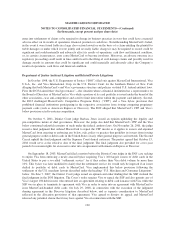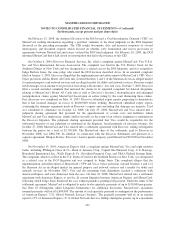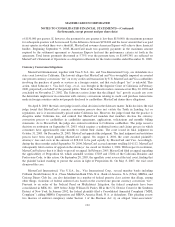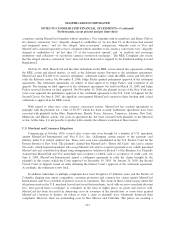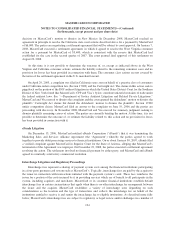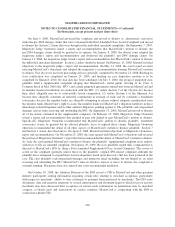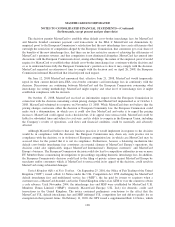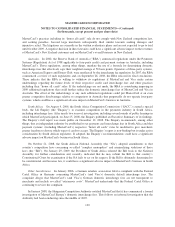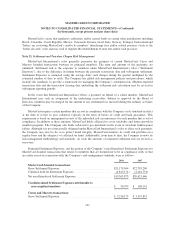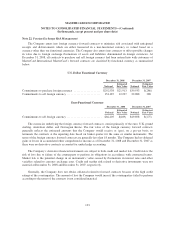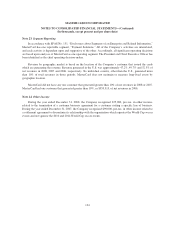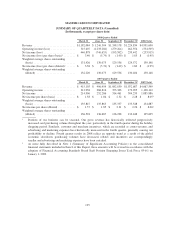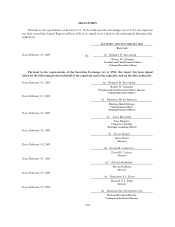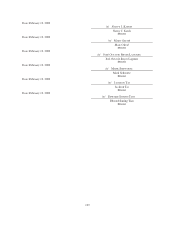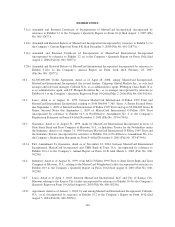MasterCard 2008 Annual Report Download - page 140
Download and view the complete annual report
Please find page 140 of the 2008 MasterCard annual report below. You can navigate through the pages in the report by either clicking on the pages listed below, or by using the keyword search tool below to find specific information within the annual report.MASTERCARD INCORPORATED
NOTES TO CONSOLIDATED FINANCIAL STATEMENTS—(Continued)
(In thousands, except percent and per share data)
MasterCard’s practices including its “honor all cards” rule do not comply with New Zealand competition law,
and seeking penalties. Several large merchants subsequently filed similar lawsuits seeking damages and
injunctive relief. The litigations are currently in the written evidentiary phase and are not expected to go to trial
until October 2009. A negative decision in these lawsuits could have a significant adverse impact on the revenues
of MasterCard’s New Zealand customers and on MasterCard’s overall business in New Zealand.
Australia. In 2002, the Reserve Bank of Australia (“RBA”) announced regulations under the Payments
Systems (Regulation) Act of 1998 applicable to four-party credit card payment systems in Australia, including
MasterCard’s. Those regulations, among other things, mandate the use of a formula for determining domestic
interchange fees that effectively caps their weighted average at 50 basis points. Operators of three-party systems,
such as American Express and Diners Club, were unaffected by the interchange fee regulation. In 2007, the RBA
commenced a review of such regulations and, on September 26, 2008, the RBA released its final conclusions.
These indicate that the RBA is willing to withdraw its regulations if MasterCard and Visa make certain
undertakings regarding the future levels of their respective credit card interchange fees and other practices
including their “honor all cards” rules. If the undertakings are not made, the RBA is considering imposing in
2009 additional regulations that could further reduce the domestic interchange fees of MasterCard and Visa in
Australia. The effect of the undertakings or any such additional regulations could put MasterCard at an even
greater competitive disadvantage relative to competitors in Australia that purportedly do not operate four-party
systems, which could have a significant adverse impact on MasterCard’s business in Australia.
South Africa. On August 4, 2006, the South Africa Competition Commission (“SACC”) created a special
body, the Jali Enquiry (the “Enquiry”), to examine competition in the payments industry in South Africa,
including interchange fees. After nearly two years of investigation, including several rounds of public hearings in
which MasterCard participated, on June 25, 2008, the Enquiry published an Executive Summary of its findings.
The Enquiry’s full report was made public on December 12, 2008. The Enquiry recommends, among other
things, that an independent authority be established to set payment card interchange fees in South Africa and that
payment systems’ (including MasterCard’s) respective “honor all cards” rules be modified to give merchants
greater freedom to choose which types of cards to accept. The Enquiry’s report is non-binding but is under active
consideration by South African regulators. If adopted, the Enquiry’s recommendations could have a significant
adverse impact on MasterCard’s business in South Africa.
On October 21, 2008, the South African National Assembly (the “NA”) adopted amendments to that
country’s competition laws concerning so-called “complex monopolies” and criminalizing violations of those
laws (the “Bill”). On January 29, 2009, the President of South Africa referred the Bill back to the National
Assembly for further consideration and, recently, indicated that he may submit the Bill to that country’s
Constitutional Court for examination if the NA fails to act on his request. If the Bill is ultimately determined to
be constitutional and becomes law, it could have a significant adverse impact on MasterCard’s business in South
Africa.
Other Jurisdictions. In January 2006, a German retailers association filed a complaint with the Federal
Cartel Office in Germany concerning MasterCard’s (and Visa’s) domestic default interchange fees. The
complaint alleges that MasterCard’s (and Visa’s) German domestic interchange fees are not transparent to
merchants and include so-called “extraneous costs”. MasterCard understands that the Federal Cartel Office is
continuing to review the complaint.
In January 2008, the Hungarian Competition Authority notified MasterCard that it has commenced a formal
investigation of MasterCard Europe’s domestic interchange fees. This follows an informal investigation that the
Authority had been conducting since the middle of 2007.
130


